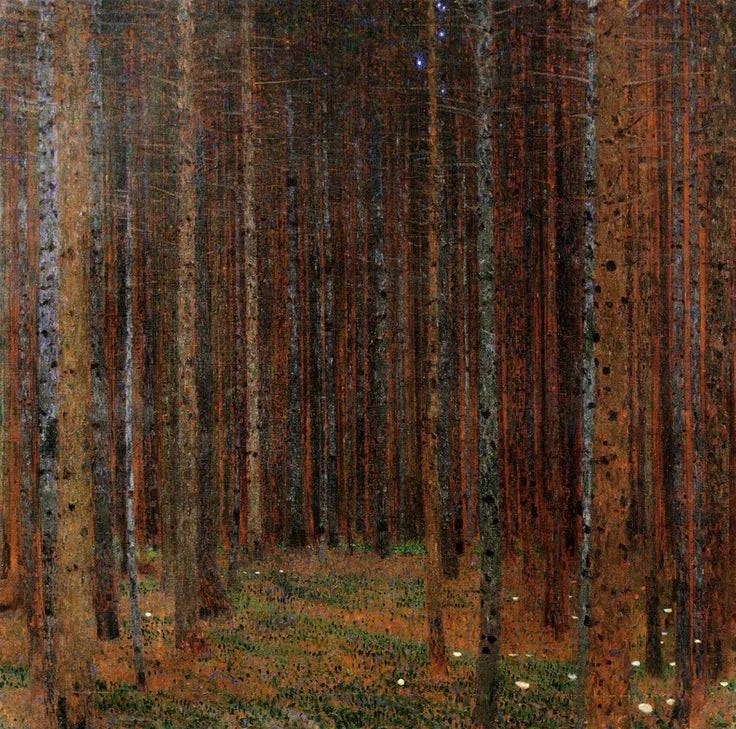The year is coming to a close. I have never gotten into the new year hoopla: time, like life, is continuous, and there is no "new" year - but a year does represent a significant passage of time, and one can’t help but reflect on the year past. This post is thus about some thoughts that have recurred to me over the past year - some I may have written about already, and some I may take up to write more fully in the coming year.
One tension I feel more acutely now is that the desire to be part of something bigger often feels at odds with being one’s own person. The space to think through what one really believes is becoming more and more constrained. It is not just about public expression - but even knowing what one thinks about something requires a kind of dialectical inquiry that is no longer supported by institutions.
To be part of something larger - a community, an institution, or even a movement - increasingly requires adopting wholesale the viewpoints and identities of that group. Views no longer exist in a neutral, intellectual space but are instead immediately politicized, yoked to identity, and subsumed under the reductive logic of partisanship. Any deviation from group orthodoxy is thus suspect, leaving little room for genuine exploration or deliberation.
Institutional spaces, which once facilitated horizontal connections and collective meaning-making, are now regimented by top-down pressures. Money and power have become stand-ins for genuine collaboration because they are the only forces that can convene and sustain institutions. In this environment, individuals can still cultivate personal brands and roam the wilderness as lone rangers, but the space for intellectual creativity and institutional renewal has shrunk.
The first consequence of this is tangible intellectual stultification in institutions. The capacity to critique one’s own context is what leads to creativity and intellectual renewal. But the space for internal deliberation has shrunk to the extent that outlier discussions have limited capacity to influence institutional action. Since everything is juxtaposed as for or against, much like how internal disagreements are suppressed to present a united front in wartime, institutional spaces have forced a closing of the ranks, stifling debates and critiques that lead to intellectual depth and progress.
This dynamic has led to a notable dearth of big ideas in public discourse. The “big” ideas are often literally about bigness - an obsession with size and scale, whether in infrastructure, technology, or processes. It is not that these ideas don’t represent significant achievements, but they seem disconnected from thinking that allows us to make meaning out of our lives. Big ideas should challenge our assumptions, reframe our understanding, and spark new possibilities. Yet, our public imagination seems stuck in the same old, same old - just bigger, better, and shinier.
Consequently, too many things are boring and blah. There is too much staleness in what we read, see, and do. In our politics, antagonism and changing sides often stand in for revolutionary thinking. Knee-jerk escalation of conflict, self-righteousness, calling out, and public antagonism, reducing everyone to their identities - all feel too easy, and again, boring.
For instance, speaking only for myself, as a woman, the feminist discourse is both important and urgent but often ends up feeling reductive instead of illuminating of my own experience. At times, it seems grasping and opportunistic, overlooking real inequities even within the collective experience of women. Centrism, often dismissed as a “safe” or pro-establishment stance, actually holds potential for intellectual depth because it fosters interactions across the spectrum of perspectives to generate new ideas.
It’s almost impossible to find anything interesting to watch. Big cinema is, of course, blah, but so is OTT. One segment of OTT content is rendered impotent through the multiple rounds of risk-averse corporate vetting that all scripts must go through before being greenlit. Another goes to the opposite extreme, relying on sensationalism in the name of realism but coming across as crude, juvenile, or cynical. Critiquing power or calling out injustice can be courageous and truthful, but without depth, it risks feeling facile and conformist in its own way. Our public discourse as a whole thus feels shallow and predictable.
I didn't intend for this to be so, but this has turned into a bit of a winter lament! Part of it is that our public life and engagement are no longer a source of joy because they have become so fragmented, shallow, and antagonistic. The staleness in our public life isn't just an aesthetic complaint but reflects a deeper hollowing of how we think and engage collectively. The mechanisms that once generated genuine intellectual ferment and personal connections have been replaced by performance, partisan alignment, and the comforting illusion of belonging by taking sides.
Yet naming this too feels like part of a tired genre of cultural criticism. Perhaps what's needed isn't another call for renewal or depth, but simply the quiet work of thinking and doing, trying to find or create those rare spaces where ideas can evolve without immediately being conscripted into existing battles. The new year, arbitrary marker that it is, at least offers a moment to acknowledge this - and to seek out conversations that don't begin with knowing where they must end.
PS: Here’s Bhimsen Joshi and Zakir Hussain in a sublime rendition of Shudh Kalyan


I would like to take my time out to appreciate your effort in writing such articles. You are honestly very intelligent and possess good english language. I hope you become part of a big movement and come out of your Catilinarian Existence.